Just a place for me to archive/hoard/collect info or posts I want to be able to find again for reference. Only reblogs ahead! Use of the word "steal" is tongue-in-cheek, not literal.
Don't wanna be here? Send us removal request.
Text
One of the issues you run into when you're not allowed to express anger as a child, is that you're no longer able to get angry. When you're in a situation that should evoke rage, you instead feel fear, anxiety, panic, or grief, emotional hurt and helplessness. You end up operating a body that cannot feel or express anger. The only times you do feel angry is when you're directing it at yourself, it comes as a form of self hatred, and desire to cause pain and injury to yourself. Because this is the only way you would have been allowed to be angry, only way it was safe, to direct it at yourself, same as everyone else is doing constantly, teaching you that it's normal and expected.
Growing up like this means that all of the anger from your childhood keeps getting stored into your body instead of externalized, and you still cannot get angry when the situation demands it. Instead, when you're being disrespected and injustice is served in your face, you can either feel helpless and lost, or the frustration you feel irritates you so much you cannot stand it. Your body is not used to feeling anger and doesn't know how to process it. Instead it feels like you're going to explode, restless, endlessly irritated and at a complete loss on how to handle it. Because you never learned how to handle anger, except to take it out on yourself, and you might be driven to just keep doing that, forever.
Taking a stand for yourself and confronting whoever deserved your anger might still feel terrifying and all of the insane things that happened to you as a result of childhood anger might get triggered. You might feel too frightened to confront them because you can imagine all sorts of ways it could come back to hurt you - this person could try to get you fired, for example. They might smear campaign you and get you evicted, they could threaten you with something or blackmail you, they could destroy something of yours, spread rumors, hold a grudge and do thousand times worse to you. Those are thoughts evoked by memories of childhood, where abusive parents threatened and did any or all of these things, including torture, in order to keep you from expressing anger.
However this person is hurting you right now, unprovoked, and getting no resistance. From that, they're learning that they can keep doing it, with zero consequences, because you've already been broken and cannot fight back. That is a dangerous situation to be in too, even if it is impossible to predict whether this person is insane like your parents and will try to get revenge for any bit of resistance for their abuse.
I had situations where I would be pushed over the edge and allowed my anger to come out at someone - and people would sometimes complain about it, but they would usually back off, and I would regain my peace of mind because I created a consequence for disturbing it. Anger, however, doesn't feel good. My body is not used to it so it makes me incredibly tense, stressed, frustrated and upset, and it doesn't go away for several days, even weeks sometimes. Because scratching the surface of it evokes the repressed childhood anger which is almost unbearable with how giant it is.
Human body can learn to process anger, it can feel better, more powerful and more in control because of it. It can protect you without inflicting damage to others. It doesn't make you anything like your abusers, who let their anger out at someone who wasn't their equal, had no way to fight back, and did not deserve any of it. Your anger creates boundaries that keep you safe, it doesn't exist to torture others for existing.
It's easy to fall back into the place where you don't want to be angry, and try to be accommodating and allowing of injustice, just so you don't have to feel frustrated and afraid. I often fall back on it too, just wanting to live and have peace. But life around other people often doesn't allow it, and sometimes anger is necessary to send a message of what boundaries will not be crossed without a consequence. Anger is not a bad feeling, it is an act of self love. It comes out to let you know that you've been treated unfairly and it's there because it's telling you that you matter. That treating you unfairly is something to get mad about.
3K notes
·
View notes
Text
A lot of the time, us trauma survivors think our trauma isn’t “that bad”. We invalidate ourselves. And sometimes our struggles are the only evidence we have that it was bad. This can make healing hard sometimes because you feel like by healing that you’re proving it wasn’t “that bad”.
So, this is a reminder that it was that bad and even if you get to a place where it doesn’t affect you as much, it was still that bad and you’re valid. The fact that you had to heal at all is proof your struggles were bad enough.
1K notes
·
View notes
Text
While I'm happy that the word "gaslighting" is more known than it used to be, and that people at large are learning to recognize what it looks like, I feel like we need to be careful not to turn it into something soft and casual we throw around off the cuff without meaning.
Being gaslit is psychological abuse that fucks you up very badly, very slowly, at such a gradual pace that you don't usually know it's happening until it's already re-wired your brain.
If you're unfamiliar with the term, "to gaslight" is to intentionally persuade someone that they cannot trust their own perceptions of reality. It's a destabilizing form of manipulation that leaves you constantly anxious, off-balanced, confused, and dependant on others.
This is done by lying about events that have happened or about things that are happening, invalidating feelings and observations, and either denying, refusing to acknowledge, or deflecting away from hard facts.
As someone who has experienced gaslighting as a form of abuse, this is what I remember from when I didn't know anything was off:
"Oh, I must have forgotten what really happened."
"I'm just not seeing it from their point of view."
"Everyone has their ups and downs. This is normal."
"I guess I wasn't thinking about what I was doing."
"I must have been wrong."
This is what I remember from when I first started realizing something was weird:
"How come every time I'm convinced they did something wrong, they just talk to me a few minutes, and I end up asking for their forgiveness? What has me so convinced I was right in the first moment?"
"I should start writing things down when they happen, so I can go back and check later when I'm confused."
"If every relationship like ours (familial, romantic, platonic) works this way, how come I never hear about it, or read about it, or see it anywhere else?"
Getting out and adjusting to the real world is hard, too, and comes with rapid swings of unfounded guilt, shame, fear, anxiety, and self-deprication that are completely unfounded in reality.
You've been conditioned to believe that you are entirely helpless and unable to think for yourself, possibly "crazy" or otherwise fundamentally impaired, and that there is a singular source of guidance that knows exactly what is right, and all of a sudden that pillar of support has vanished.
The immediate "after" that I recall looks like:
Constant uncertainty. Because nobody is there to tell you what's real and what isn't, you approach every situation thinking at it from all angles. Every question has fifty possible answers and most of them are wrong and you don't know which. If you choose wrong, the world will end.
A sense of helplessness. You feel that nothing you do is correct, and it's easier to make no choices at all- or you make wild, reckless, impulsive choices, because you feel you have nothing to lose.
Memory loss. I don't understand this one, but it's not like memoriescare being erased, but more like... you're so used to treating your memories as dreams or imaginations that you reflexively dismiss anything you recall as fake, and you can't believe anything you recall because you don't think it was real. Your abusers voice is in your head, wiping things away and telling you that you did the wrong thing. And you believe them, because they're the only constant you can rely on.
Missing the abuser, or the abusive dynamic. Because you know now that it wasn't healthy, but at least you knew where you stood. As long as you said the right things and acted the right way, agreed and obeyed and did as they expected, you felt like thevworld made sense. Now you have to figure out which parts of you really are broken, and which parts are working fine in a really weird way, and it's like tuning a piano when you've never played one before.
The long term "after"- for which I can only speak for myself- looks like:
Having to double-check, triple-check, and continue checking hard evidence of an event before responding in an active way.
Consulting with trusted friends to verify that your observations are legitimate and that your perceptions are valid. Following up with them to see if someone is really angry at you, or if you're just projecting anger onto them because it's what makes sense to your old pattern.
Obsessive collection of "evidence"- saving pictures, writing detailed journals, making recordings and video, never deleting emails or old texts, because you still don't quite trust yourself all the way and you're afraid that someone will cause you to doubt yourself again.
Continued self-doubt and being "gullible": I have straight up seen people flip me off to my face in front of witnesses and then immediately tell me, "No, I was just waving", and my first instinct is to believe them. For a few seconds, I *really do* believe them. Your brain is so trained to latch onto what people tell you to believe that its really, really hard to hold onto information that you already have.
Learning to take ownership over your own actions. (I didn't mess up because I'm "crazy", I messed up because I'm a person and people do that.)
Instinctively seeking approval. (Takes a lot of work to remind myself that I don't exit to make people happy, and that some people suck ass, and I can tell them to piss off.)
I don't intend to invalidate anyone currently struggling with this- if you feel that something is wrong, it probably is. That's the thought that got me out. Trust that feeling that something isn't right.
I just want people who don't know what to look for to know what gaslighting *actually* looks and feels like, so they don't just roll their eyes and think, "Oh, that word doesnt apply to me- I'm not some snowflake".
('Cause we all saw what happened with "triggered", right?)
6K notes
·
View notes
Text
people with adhd, psychosis, brain fog, schizophrenia or anything that affects memory, recall and perception of reality are so at risk of gaslighting. even when you’re pretty sure you did/didn’t do a thing, if someone suggests that it didn’t actually happen that way or you’re skewing the facts or you’re just misremembering of whatever, you start to question yourself and your own memories and that is very easy to take advantage of. and it’s so incredibly difficult to get anyone to believe you or take you seriously because not even you are 100% sure you’re recalling things correctly. it sucks so bad not being able to rely on your own memory and to have to worry about people using it against you (because they can and will)
11K notes
·
View notes
Text
gentle reminder that gaslighting isn't always an abuser blatantly calling you crazy. they may lecture you about how you're misinterpreting something. they may say something very serious is no big deal. they may get passive aggressive and leave you feeling irrational. or they may get furious at you for being overdramatic without ever directly calling you that.
gaslighting is a form of manipulation, and manipulation is most effective when the victim doesn't even notice it's happening. "you're just insane" is a lot more obvious than "i don't remember that happening, are you sure it wasn't just a bad dream?" and whether it's over or covert, both are horrible. both are dangerous. both are abusive, and oftentimes neglectful.
be careful out there, and know you know yourself best. you are the expert on you - your mind, your body, your life. no one can change that. not even the people who wield so much power over us.
414 notes
·
View notes
Text
smth smth its fucked how ppl idk view ? regard ? assume ? shit abt victims n abusers like
how abusers will intentionally isolate n cut off their victims during the relationship to make the victim alone n codependent on their abuser w the goal to make the victim stay in the abusive relationship for as long as possible to cut off support n make it easier to gaslit groom n abuse the victim
n afterwards
the victim now has no one n when they r rightfully angry n upset n talk abt all the shit their abuser put them thru
but the abuser has their circle of friends n partner/s n support n they r not saying anything abt the relationship bc they r stonewallers n use darvo n never rlly cared abt the victim anyways so ppl just discredit the victim purely bc the victim is alone n angry n talking shit bc surely the one who is angry n alone n talking shit is the actual abuser right they r obvs just bitter n attn seeking n if the actual abuser rlly was abusive then why do they have a support system who they have had for yrs now clearly the support sys knows better then a bitter lonely jaded ex if the accused abuser is actually abusive or not right
but that fucking shit is done by design by the abuser darvo keeps working long after the abusive relationship is over n that shit is just so fucked bc ptsd recovery is all abt reaching out n making new friends new connections new memories new positive connotation to heal the old neuropath ways but u cant fucking do that when u dont perform ur own victimhood the right way for ppl who have never been abused in their lives to judge u accordingly to some made up standard in their heads so well after the abusive relationship is over the victim is still left all alone n isolated n being gaslit bc no one believes them bc they r still alone n angry n talking shit abt their abuser everything the abuser set up intentionally by design during the abusive relationship remains unchallenged long after the relationship ends in situations like that n how tf is the actual victim ever supposed to heal like that
91 notes
·
View notes
Text
This is for everyone who feels like they're going crazy trying to figure out if they were/are being abused.
Not every insult sounds like 'your stupid' or 'your ugly'
Abusers may not say 'your just crazy' when they try to gaslight you. They may say things along the lines of
'you dont even try'
'if you were smarter you would ____'
'why can't you be normal?'
When trying to insult you
They may say something along the lines of
'Well I'm sorry that's what you *thought* I did'
'you need a therapist your mental illness is changing your perception'
'why do you argue everything'
When they try to gaslight you
Lots of abusers try to be subtle about how they insult and manipulate you so they can hide behind plausible deniability.
"we weren't trying to insult/manipulate you we'd *never* do that! I can't believe this is what you think of us. That just shows that *you're* in the wrong. You need to apologize"
Sound familiar?
They're *trying* to make you to feel crazy, it lets them keep getting away with it. And if you think 'they wouldn't do that *on purpose*, it must be unconscious' they want you to think that to. It also doesn't excuse their behavior even if it is unconscious
#wanna add an offshoot of one of these too#'if you're truly this upset about this minor thing I did then you're so sensitive you need professional help'#abuse#gaslighting#emotional manipulation#to this day I can't tell if it was really meant compassionately or not#I think on some level it was?#but got damn man
383 notes
·
View notes
Text
Being accountable for your mistakes and the things you've allowed in your life is important and crucial for success. At the same time, we don't live life in a vacuum and we cannot absolve other people of the responsibility in causing suffering or aiding in our pain.
Accountability is important, extreme accountability is toxic. The latter could be considered a form of gaslighting that makes us question if our reactions to others wrongdoings towards us by placing an adequate level of blame to them is rational.
You can still learn from the past experiences of hurt others have caused towards you to try to act accordingly in liue of your wellbeing in the future, and heal from it, without internalizing a toxic sense of accountability that should be attributed to others and not yourself.
Taking in the blame for other people's actions isn't "taking control over your life", it's suppressing the pain and assuming ownership for the wrong doings of others.
616 notes
·
View notes
Text

#hoOOOh BOY#oh if this hasn't been the vibe for the last three and a half fuckin years lads#three and a half and then some
1K notes
·
View notes
Text
This isn’t directed @ anyone specific just a side effect of some stuff I’ve been dealing with lately but for whoever needs to hear it, as a 25 year old who has seen many friendships fall apart in my days, one of the most important social skills you need to learn how to do is approaching someone in your life when you have a problem with something they said or did
I think social media and general internet talking is great and all but it gives way to a lot of really bad habits like, reading a message and getting upset, ignoring the other person, unfollowing/blocking in response, things that would otherwise be noticeable in a face to face interaction
It’s not healthy or productive at all to stew in frustration while the other person has no idea you’re even upset, and when (or even if) you finally let them know days or weeks or god only knows how long later, you’ve given yourself way too much time to dwell into more extreme feelings. I can’t tell you how many times I’ve had vicious arguments over things that were as simple as a misinterpretation of what I said and could’ve been solved in 5 minutes had they just said “hey, that hurts my feelings”
I know approaching people can be difficult and scary, but being an adult and maintaining adult relationships absolutely requires this basic communication skill. If you see a therapist, this is something they can absolutely help you with!
29K notes
·
View notes
Text
This isn’t directed @ anyone specific just a side effect of some stuff I’ve been dealing with lately but for whoever needs to hear it, as a 25 year old who has seen many friendships fall apart in my days, one of the most important social skills you need to learn how to do is approaching someone in your life when you have a problem with something they said or did
I think social media and general internet talking is great and all but it gives way to a lot of really bad habits like, reading a message and getting upset, ignoring the other person, unfollowing/blocking in response, things that would otherwise be noticeable in a face to face interaction
It’s not healthy or productive at all to stew in frustration while the other person has no idea you’re even upset, and when (or even if) you finally let them know days or weeks or god only knows how long later, you’ve given yourself way too much time to dwell into more extreme feelings. I can’t tell you how many times I’ve had vicious arguments over things that were as simple as a misinterpretation of what I said and could’ve been solved in 5 minutes had they just said “hey, that hurts my feelings”
I know approaching people can be difficult and scary, but being an adult and maintaining adult relationships absolutely requires this basic communication skill. If you see a therapist, this is something they can absolutely help you with!
29K notes
·
View notes
Text

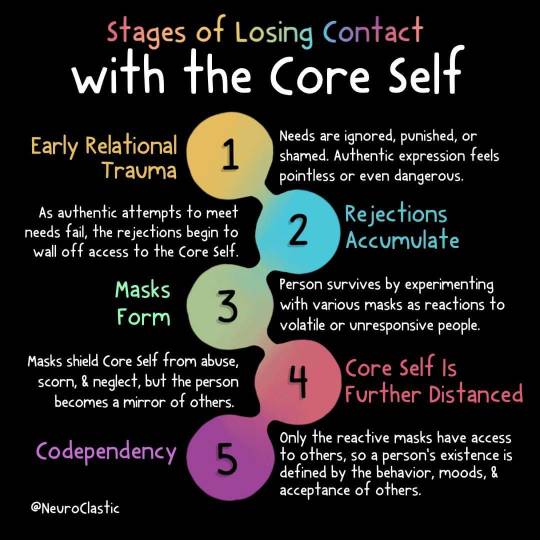
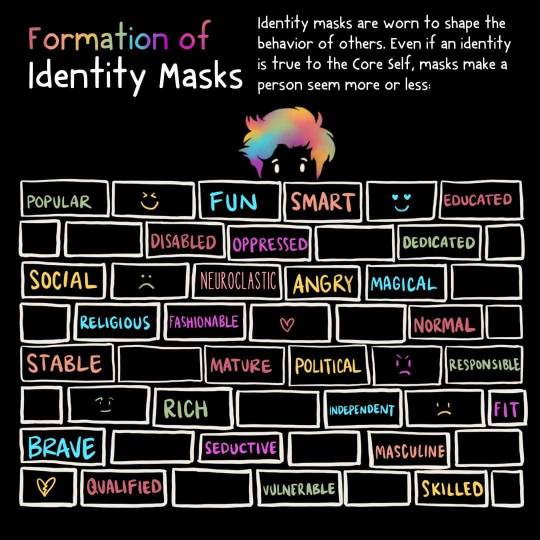

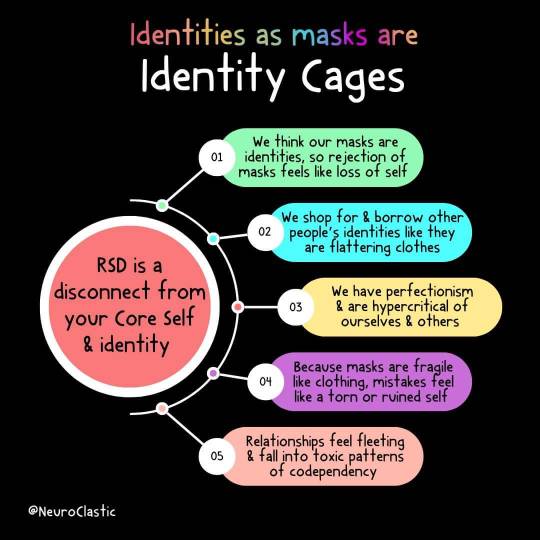
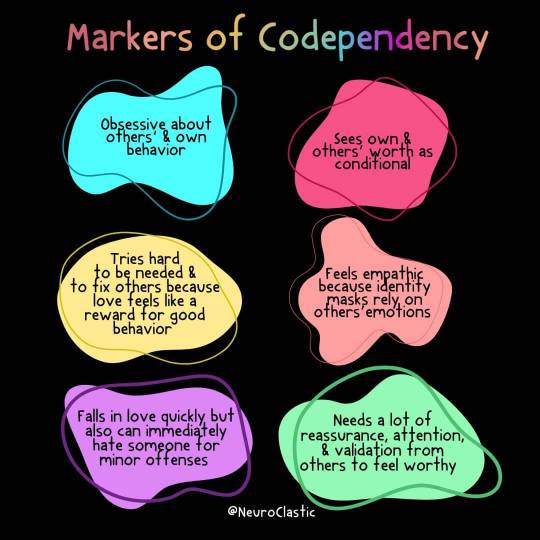
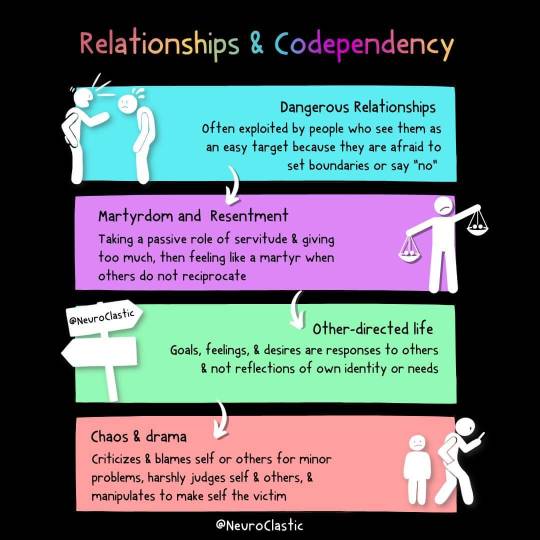

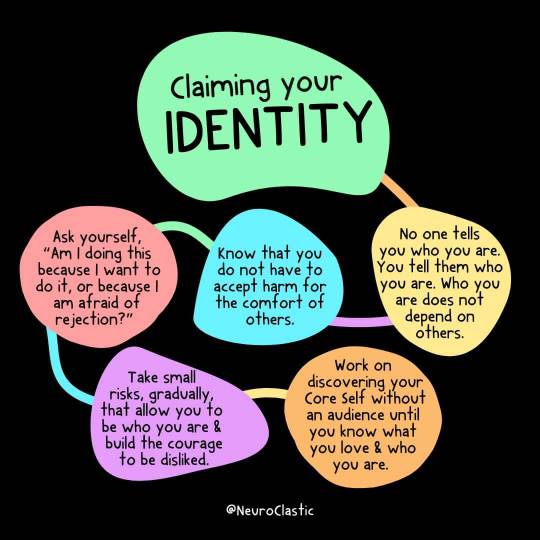
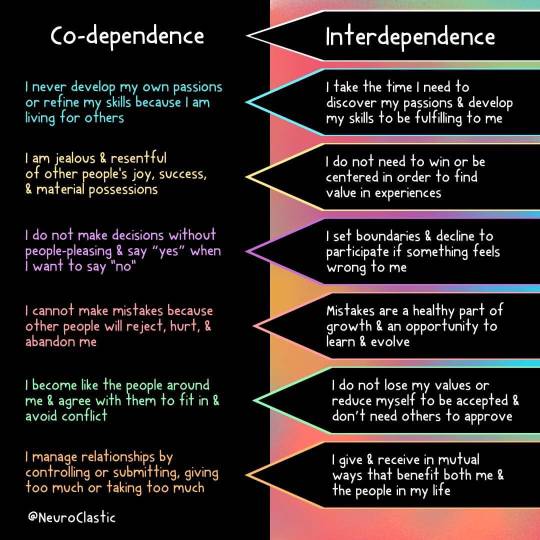
Source ~ Neuroclastic
[Image IDs: Ten slides from Neuroclastic. All descriptions from Neuroclastic.
All images have a black background with candy-colored rainbow text and graphics
Slide 1: image features a rainbow silhouette with a brain full of talk bubbles that have insults in them. Insults include crybaby, sensitive, freak, weirdo, suck up, snowflake, idiot, stupid, loser, boring, try hard, histrionic, gross, etc.
From the silhouette is a talk bubble that reads, "This is not my voice"
Image is titled, "On Rejection Sensitive Dysphoria, Codependency, & Identity"
Slide 2: Titled "Stages of losing contact with the core self"
There is a 5-point zig zag graph with the following stages
Early Relational trauma: Needs are ignored, punished, or shamed. Authentic expression feels pointless or even dangerous.
Rejections accumulate: As authentic attempts to meet needs fail, the rejections begin to wall off access to core self Masks form: Person survives by experimenting with various masks as reactions to volatile or unresponsive people. Core self is further distanced: Masks shield Core Self from abuse, scorn, & neglect, but the person becomes a mirror of others
Codependency: Only the reactive masks have access to others, so a person's existence is defined by the behavior, moods, & acceptance of others.
Slide 3: Titled "Formation of Identity Masks"
An animated character with rainbow coloured hair peeks over a brick wall, each brick containing different words and symbols, while some bricks remain empty. Text above the character reads: "Identity masks are worn to shape the behavior of others. Even if an identity is true to the Core Self, masks make a person seem more or less:
[Words and symbols in bricks]
Popular, amused emojil, fun, smart, heart eyes emoji, educated, disabled, oppressed, dedicated, social, sad emoji, neuroclastic, angry, magical, religious, fashionable, heart icon, normal, stable, mature, political, angry symbol, responsible, smirking emoji, rich, independent, sad emoji, fit, brave, seductive, masculine, heartbreak icon, qualified, vulnerable, skilled.
Slide 4: Titled "Disconnection from our Core Self"
Text below reads: Eventually, we lose contact with our Core Self so that no identity feels real. Identities become more like outfits to put on & wear in different settings the same way we change clothes.
Different bubbles each read:
We mask as someone new in every situation & context
Who we are in the moment depends on the moods & behaviors of people around us
We do not realize that others are not also wearing identities as clothing
We have learned that boundaries get us in trouble, so we don't set them
We are then shocked & feel rejected when others set boundaries
We think people who know themselves are performing and boundaries are rude
Slide 5: Titled "Identities as masks are Identity Cages"
A circle has various bullets emanating from it, each occupying its own oval.
Text within circle reads: RSD is a disconnect from your Core
Self & identity
Bullets are numbered below:
We think our masks are identities, so rejection of masks feels like loss of self
We shop for & borrow other people's identities like they are others flattering clothes
We have perfectionism & are hypercritical of ourselves & others
Because masks are fragile like clothing, mistakes feel like a torn or ruined self
Relationships feel fleeting & fall into toxic patterns of codependency
Slide 6: Titled "Markers of Codependency"
Different shapes with similarly shaped wiggly lines arranged in a 2x3 arrangement, outline different markers of codependency, as follows:
Obsessive about others' and & own behavior Sees, own & others' worth as conditional
Tries hard to be needed & to fix others because love feels like a reward for good behavior
Falls in love quickly, but also can immediately hate someone others to feel worthy
Feels empathetic because identity masks rely on others' emotions for minor offenses
Needs a lot of reassurance, attention, & validation from others to feel worthy
Slide 7: Titled "relationships and Codependency"
4 rectangles, each with different representative graphics and unique titles, leading to the one after them.
The first is titled "Dangerous Relationships" with a one character confidently speaking to/advising a seemingly downcast character.
Text reads: Often exploited by people who see them as an easy target because they are afraid to set boundaries or say "no"
The second is titled "Martyrdom and Resentment" with an uncertain looking character holding an unbalanced balance scale.
Text reads: Taking a passive role of servitude & giving too much, then feeling like a martyr when others do not reciprocate
The third is titled "Other-directed life" with a signpost, one sign reading @NeuroClastic while the other remains blank.
Text reads: Goals, feelings, & desires are responses to others & not reflections of own identity or needs
The fourth is titled "Chaos & Drama" with one character with their finger up, walking away from a confused looking character.
Text reads: Criticizes & blames self or others for minor problems, harshly judges self & others, & manipulates to make self the victim
Slide 8: Titled "Reconnecting To The Core Self"
A circle is divided in quadrants, each describing ways to reconnect with one's Core Self.
The first quadrant is titled: Locating the Core Self The Core Self is not lost, just disconnected. It is the internal voice asking, "Who am I?" and the source of grief beneath the masks. Try to focus on that voice and connecting with your Core Self..
The second quadrant is titled: Dropping the Masks Identity is the whole tree - the roots, trunk, leaves, and fruit. Masks are the parasitic vines of unhealthy relationships and trauma. Begin to remove the vines one at a time when it's safe to do so.
The third quadrant is titled: Losing Value Judgements Dissociating from the Core Self means a person sees the behavior as identity, then strives to be perfect and push others to never make mistakes. You are not your behavior.
The fourth quadrant is titled: Learn to Set Boundaries Boundaries are more effective than masks at protecting the Core Self and prevent you from focusing externally to depend on others to meet your needs and maintain your autonomy.
Slide 9: Various stone shapes containing text are linked by a curving line. The topmost stone reads: Claiming Your Identity
Other stones follow, respectively reading:
No one tells you who you are. You tell them who you are. Who you are does not depend on others.
Know that you do not have to accept harm for the comfort of others.
Ask yourself, "Am I doing this because I want to do it, or because I am afraid of rejection?"
Take small risks, gradually, that allow you to be who you are & build the courage to be disliked.
Work on discovering your Core Self without an audience until you know what you love & who you are.
Slide 10: A comparison between Co-dependence and Interdependence.
The co-dependence pointers remain on a black background, whereas the inter-dependence pointers are enclosed in pencil shaped boxes, which in turn are placed against a rainbow coloured background.
The co-dependence pointers read:
I never develop my own passions or refine my skills because I am living for others
I am jealous & resentful of other people's joy, success, & material possessions
I do not make decisions without people-pleasing & say "yes" when I want to say "no"
I cannot make mistakes because other people will reject, hurt, & abandon me
I become like the people around me & agree with them to fit in & avoid conflict
I manage relationships by controlling or submitting, giving too much or taking too much
The inter-dependence pointers read:
I take the time I need to discover my passions & develop my skills to be fulfilling to me
I do not need to win or be cenetred in order to find value in experiences
I set boundaries & decline to participate if something feels wrong to me
Mistakes are a healthy part of growth & an opportunity to learn & evolve
I do not lose my values or reduce myself to be accepted & don't need others to approve
I give & receive in mutual ways that benefit both me & the people in my life
End ID]
Further Reading from Neuroclastic:
3K notes
·
View notes
Text
This is for everyone who's gotten out of an unhealthy, toxic, or abusive situation - with family, a relationship, friendship, a workplace, anything - physically, but are still stuck in it mentally, with what feels like very little progress. You're not alone, and your experiences weren't any less real just because they don't fit a mold. You've made it this far already, and every day you continue to survive is a day closer to the one you wake up and realize you're finally free.
#mental health#abuse#this blog is for archiving but idk. this gets to be the exception#as a clarification too - by 'fit a mold' I'm referring to the kind of narrative that#when you leave the thing you start feeling better immediately#for me that wasn't true and in a way it was actually kind of the start of the real struggle#and statistically speaking I know I can't be the only one!#so this is for everyone else out there who struggles with this this#I see you and I feel you#and if I was in the room with you I would cry alongside you
0 notes
Text
Having a friend you thought you were gonna spend your whole entire life with like start a home together and everything but then it didn’t work out. It’s hard to describe that kind of break up to most people. I made peace with it a long time ago and we’re on good terms now but nothings gonna go back to how it was. That future I thought I was gonna have with them just didn’t happen.
The hardest part at this point is like finding people who relate to me on it. Or even see it as a thing that needs to be moved past. I find myself relating to a lot of people when they talk about break ups with romantic partners but they don’t relate to me. Which is a weird sort of isolating.
I don’t think I’ve ever met someone else with this experience. I had a platonic break up at one point with someone I’m just friends with now. And I don’t think that either of us know how we’re supposed to function with that in the world now. How our negative experiences fit into the world as a whole. And we can’t relate to each other because each other is the problem.
A queerplatonic relationship ending is so weird. Where do you find support? Where do you fit your experiences into the wider world around you? I’ve moved on but I can’t share my woes with others because they just can’t click with me on it. I didn’t think that aspect of it would still be bothering me all this time later but it is. I’ve got exes but they’re not romantic ones. So what do I do about that? Who do I relate to about that? Increasingly the answer seems to be nobody at all.
#friendship#relationships#aromanticism#asexuality#queerplatonic relationships#ah#I feel this keenly :'D#it's such an incredibly alien and isolating limbo to be in#for me I've never really found anything that truly 'healed' those wounds either#they've just become less powerful with time and prayer#it didn't help that there were other major issues like that with it too.#something was very wrong with the relationship as a whole and even though it's been a long time now#I still can't really explain what or why#hopefully someday#ending the friendship took years of buildup and even knowing it was the right thing to do#and even though it was 'just a friendship'#it felt like strangling part of myself#the broader cultural 'awareness' (dunno the right word) of friendship is woefully inadequate#I think even for people who are allo in both romantic and sexual respects#which is to say. rip
760 notes
·
View notes
Text
5 Tips for Dealing with Guilt
Written by John M. Grohol, Psy.D. on May 18, 2019
Guilt has an incredible way of popping up even when we’re barely doing anything at all.
Most of us learn guilt throughout normal childhood development. Guilt clues us in when we’ve stepped outside the boundaries of our core values. It makes us take responsibility when we’ve done something wrong and helps us to develop a greater sense of self-awareness. The feeling of guilt forces us to examine how our behavior affects others and make changes so that we don’t make the same mistake again.
How can we learn to deal with guilt — accepting it when it is appropriate and letting it go when it’s unnecessary?
1. Is this guilt appropriate and, if so, what is its purpose?
Guilt works best to help us grow and mature when our behavior has been offensive or hurtful to others or ourselves. If we feel guilty for saying something offensive to another person, or for focusing on our careers with an 80-hour work-week over our family, that’s a warning sign with a purpose: change your behavior or you will push away your friends or family. We can still choose to ignore our guilt then, but then we do so at our own risk. This is known as “healthy” or “appropriate” guilt because it serves a purpose in trying to help redirect our moral or behavioral compass.
The problem arises when we don’t need to reexamine our behavior or makes changes. For example, a lot of first-time mothers feel badly about going back to work part-time, fearful it may cause unknown damage to their child’s normal development. However, that’s simply not the case in most situations and most children have a normal, healthy development even when both parents work. There’s nothing to feel guilty about, yet we still do. This is known as “unhealthy” or “inappropriate” guilt because it serves no rational purpose.
If you’re feeling guilty for eating five chocolate bars in a row, that’s your brain’s way of trying to get the message to you about a behavior you probably already recognize is a little extreme. Such behavior may be self-destructive and ultimately harmful to your health and well-being. So the rational purpose of this guilt is simply to try and convince you to change this behavior.
2. Makes changes, instead of wallowing in guilt.
If your guilt is for a specific and rational purpose — e.g., it’s healthy guilt — take action to fix the problem behavior. While many of us are gluttons for self-punishment, ongoing guilt weighs us down as we try and move forward in life. It’s easy enough to apologize to someone whom we’ve offended by a careless remark. It’s a little more challenging to not only recognize how your 80-hour-a-week career may be harming your family, but to also change your work schedule (assuming that there were legitimate reasons for working 80-hours a week in the first place).
Healthy guilt is telling us we need to do something different in order to repair relationships important to us (or our own self-esteem). Unhealthy guilt’s purpose, on the other hand, is only to make us feel badly.
While sometimes we already know the lesson guilt is trying to teach us, it will return time and time again until we’ve actually learned the lesson fully. It can be frustrating, but it seems to be the way guilt works for most people. The sooner we “learn the lesson” — e.g., make amends, work to not engage in the same hurtful behavior in the future, etc. — the sooner the guilt will disappear. If successful, it will never return for that issue again.
3. Accept that you did something wrong, but then move on.
If you did something wrong or hurtful, you will have to accept that you cannot change the past. But you can make amends for your behavior, if and when it’s appropriate. Do so, apologize, or make-up for the inappropriate behavior in a timely manner, but then let it go. The more we focus on believing we need to do something more, the more it will continue to bother us and interfere with our relationships with others.
Guilt is usually very situational. That means we get into a situation, we do something inappropriate or hurtful, and then we feel badly for a time. Either the behavior wasn’t so bad or time passes, and we feel less guilty. If we recognize the problem behavior and take action sooner rather than later, we’ll feel better about things (and so will the other person) and the guilt will be alleviated. Obsessing about it, however, and not taking any type of compensatory behavior (such as apologizing, or changing one’s negative behavior) keeps the bad feelings going. Accept and acknowledge the inappropriate behavior, make your amends, and then move on.
4. Learn from mistakes.
Guilt’s purpose isn’t to make us feel bad just for the sake of it. Legitimate guilt is trying to get our attention so that we can learn something from the experience. If we learn from our behavior, we’ll be less likely to do it again in the future. If I’ve accidentally said something insulting to another person, my guilt is telling me I should (a) apologize to the person and (b) think a little more before I open my mouth.
If your guilt isn’t trying to correct an actual mistake you made in your behavior, it’s unhealthy guilt and there’s not a whole lot you need to learn. Instead of learning how to change that behavior, a person can instead try to understand why a simple behavior most people wouldn’t feel guilty about is causing them to feel guilt. For instance, I felt guilty for spending some time playing a game during regular work hours. But, since I work for myself, I don’t really keep “regular work hours.” It’s just hard for me to change that mindset after years of working for others.
5. Recognize that no one is perfect.
Not even our friends or family members who appear to lead perfect, guilt-free lives. Striving for perfection in any part of our lives is a recipe for failure, since it can never be attained.
We all make mistakes and many of us go down a path in our lives that can make us feel guilty later on, when we finally realize our mistake. The key, however, is to realize the mistake and accept that you’re only human. Don’t engage in days, weeks or months of self-blame — battering your self-esteem because you should’ve known, should’ve acted differently, or should’ve been an ideal person. You’re not, and neither am I. That’s just life.
Guilt is one of those emotions that we feel is telling us something important. Be aware that not every emotion, and certainly not every guilty feeling, is a rational one that has a purpose. Focus on the guilt that causes loved ones or friends harm. And remember to be skeptical the next time you feel guilty – is it trying to teach you something rational and helpful about your behavior, or is it just an emotional, irrational response to a situation? The answer to that question will be your first step to helping you better cope with guilt in the future.
21 notes
·
View notes
Text
Everybody talks about cutting ppl off but nobody really talks about the grief that comes with having to stand firm on that decision knowing it’s not what you wanted but what was necessary for your well-being.
#relationships#I rarely see anyone talk about the crippling self-doubt that can often hover around that kind of decision too#sometimes it's impossible I think to know if you really did the right thing or not#you just have to make the best decision you can and stick with it#and trust and pray everything will turn out ok#that's all you can do
48K notes
·
View notes
